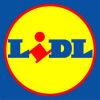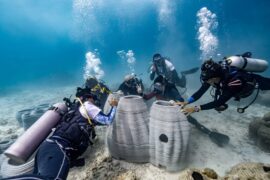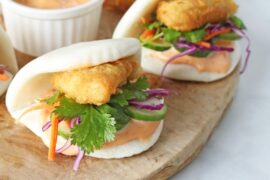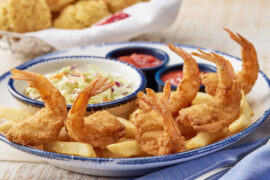The Marine Stewardship Council (MSC) and the Aquaculture Stewardship Council (ASC) hosted their annual Seafood Futures Forum at Seafood Expo Global in Brussels on April 27. It provided an opportunity for both to reflect on how safeguarding seafood for future generations relies on the power of partnerships between retailers, brands, producers and NGOs.
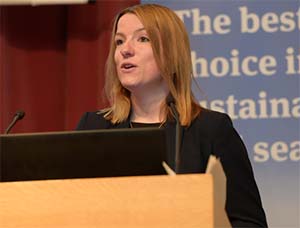 “We want to make sure that the products we sell are available in the long term and this is why their origins are so important,” emphasizes Judith Kontny of Lidl.Judith Kontny, international corporate social responsibility manager at the Lidl grocery store chain, delivered the keynote speech at the forum. Lidl was one of the first large retailers to build sustainability into its procurement process and continues to reach new heights in sustainable and responsibly sourced seafood.
“We want to make sure that the products we sell are available in the long term and this is why their origins are so important,” emphasizes Judith Kontny of Lidl.Judith Kontny, international corporate social responsibility manager at the Lidl grocery store chain, delivered the keynote speech at the forum. Lidl was one of the first large retailers to build sustainability into its procurement process and continues to reach new heights in sustainable and responsibly sourced seafood.
For example, as of January 2017, Lidl Germany only sells MSC certified products in its permanent, own-brand, frozen and non-frozen fish range. The German operation also extended its ambition to include farmed seafood and will only sell products certified by either ASC or certified organic by January 2018.
In her speech, Kontny explained that delivering on commitments has required brokering new partnerships and that challenges remained in meeting consumer demand.
She commented: “We want to make sure that the products we sell are available in the long term and this is why their origins are so important. In the years that Lidl has worked with the MSC and ASC, we have witnessed more and more fisheries and producers achieving certification, but delivering our commitment still presents challenges. For example, we are eager for more certified species, notably octopus and squid, and we believe more effort is needed to engage consumers in Eastern and Southern Europe in support of responsible and sustainable seafood.”
Partnerships Drive Positive Change
Panelists at this year’s forum came from a range of MSC and ASC partners including Mars Petcare, Sanford, Simplot and Aqua Spark. They discussed how producing and sourcing certified seafood was beneficial to their businesses and also why, in the broader context of feeding future generations, collaboration is essential. All of these partners have made significant commitments to sustainability Approximately 97% of Simplot’s John West Australia tuna products contain MSC-certified tuna, representing 43% of all canned tuna in Australia, and they have just launched the first ever MSC-certified canned tuna in New Zealand.
A further example of partnerships driving positive change, highlighted during the forum, is the Indian Ocean Tuna Commission’s (IOTC) landmark decision on harvest control rules for skipjack tuna. The MSC acted as a catalyst for the process, which was led by the Maldives, supported by other Indian Ocean coastal states and the International Pole and Line Foundation (IPNLF). Together, they ensured that a framework was put in place for improved management of skipjack stocks. It was also widely supported by a number of retailers and brands, demonstrating the collective commitment to maintaining healthy skipjack stocks in the Indian Ocean, and benefiting all fisheries, including the MSC certified Maldives pole and line fishery.
 High profile commitments to the ASC from Hilton Worldwide and Sysco Corporation, one of the largest purchasers of seafood in North America to source its top five Sysco Brand aquaculture species from farms that are either ASC certified, in assessment or in aquaculture improvement projects leading to ASC certification, are but two of the many partnerships that are helping to drive even more farms to improve their environmental and social performance.
High profile commitments to the ASC from Hilton Worldwide and Sysco Corporation, one of the largest purchasers of seafood in North America to source its top five Sysco Brand aquaculture species from farms that are either ASC certified, in assessment or in aquaculture improvement projects leading to ASC certification, are but two of the many partnerships that are helping to drive even more farms to improve their environmental and social performance.
 Nicolas Guichoux, Global Commercial Director at the MSC, remarked: “Since this time last year we have seen 51 new fisheries certified and 27 recertified, with the volume of MSC-certified seafood globally standing at 9.5 million tons. Germany is the leading market for MSC labeled products, but the fastest growth occurred in Australia, New Zealand and Spain, where volumes doubled, followed by the UK (up 50%) and Japan (up 33%). Sales have doubled in the Asia region though the volume is still much lower than in Europe.”
Nicolas Guichoux, Global Commercial Director at the MSC, remarked: “Since this time last year we have seen 51 new fisheries certified and 27 recertified, with the volume of MSC-certified seafood globally standing at 9.5 million tons. Germany is the leading market for MSC labeled products, but the fastest growth occurred in Australia, New Zealand and Spain, where volumes doubled, followed by the UK (up 50%) and Japan (up 33%). Sales have doubled in the Asia region though the volume is still much lower than in Europe.”
He continued: “We’ve also welcomed the first MSC certified pizza chain, Koti Pizza in Finland, and the 111th MSC-certified product in Tmall, China. This growth is due to the commitments of our partners and increased recognition worldwide that ensuring the sustainability of stocks is essential to protecting the oceans and the people that depend on them. The next step for us is to increase the accessibility and relevance of the MSC program globally so that regions, particularly in the Global South, can also have the tools and knowledge to safeguard seafood supplies for the future.”
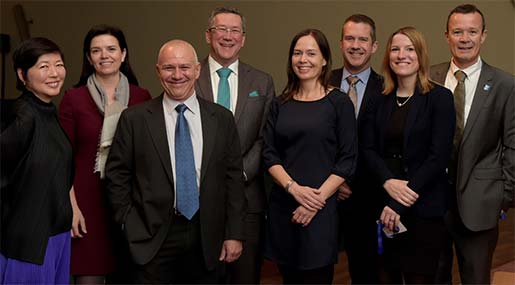 Seafood Futures Forum panelists discussed how partnerships drive positive change. Seen left to right are: Emiko Terazono, Financial Times; Isabelle Aelvoet, Mars Petcare; Manni Kalisperis, Simplot; Chris Ninnes, ASC; Stephanie Rakels, Aqua Spark; Volker Kuntzsch, Sanford; Judith Kontny, Lidl, and Rupert Howes, MSC.
Seafood Futures Forum panelists discussed how partnerships drive positive change. Seen left to right are: Emiko Terazono, Financial Times; Isabelle Aelvoet, Mars Petcare; Manni Kalisperis, Simplot; Chris Ninnes, ASC; Stephanie Rakels, Aqua Spark; Volker Kuntzsch, Sanford; Judith Kontny, Lidl, and Rupert Howes, MSC.
Esther Luiten, commercial Director of the ASC, commented: “The growth of the ASC is closely tied to the future of the seafood industry. The aquaculture sector continues to expand and we are seeing a sustained and corresponding demand for seafood produced in a manner that respects the environment, workers and the community. Over the last year, our still young program has achieved significant milestones. We now have more than 1 million tons of ASC certified seafood in the market and commitments from Hema in the Netherlands, a partnership with Japanese retailer Kasumi Co. Ltd and Carrefour, the second largest retailer in the world. The ASC is poised to respond to market needs with the introduction of new standards and strategic expansion to new regions, including China, Japan, Australia and the USA.”
More than 350 delegates from across the industry attended this year’s Seafood Futures Forum, hosted annually to provide an update on developments in the MSC and ASC and invite discussion in addressing the challenges of responsible and sustainable seafood production.
Watch a recording of the event on YouTube, and continue to follow the conversation on Twitter: #SeafoodFutures.

